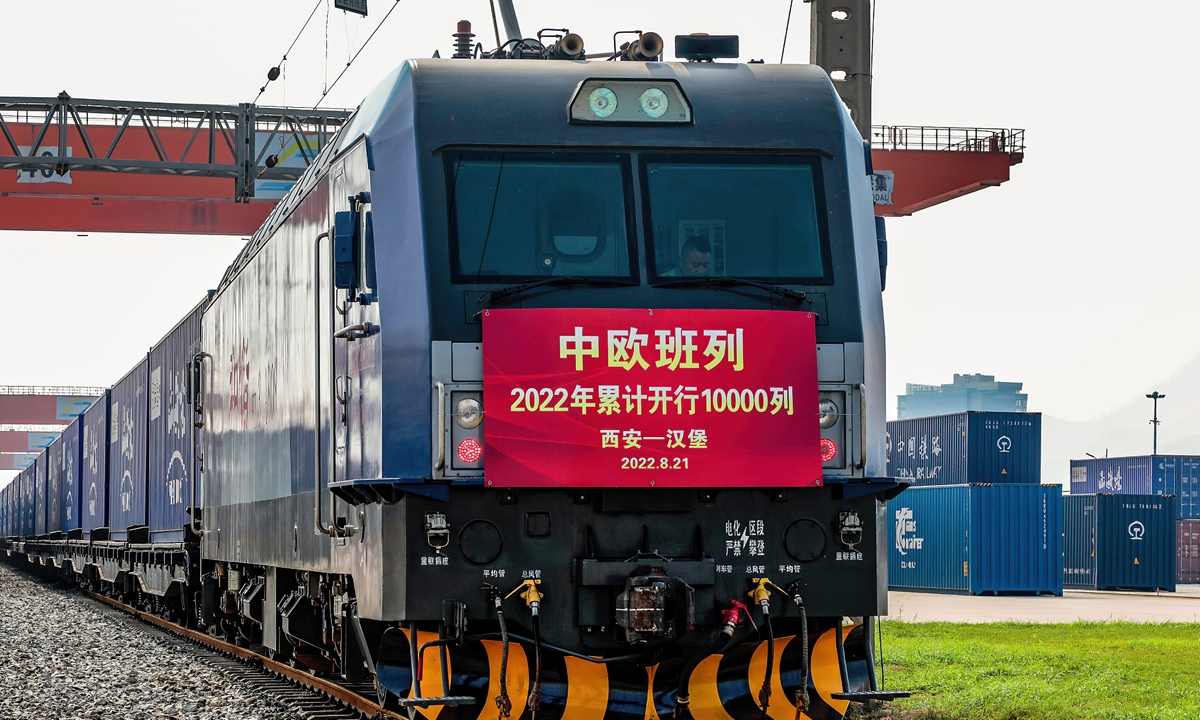
The China-Europe freight train. Photo: VCG
The EU is willing to be a reliable and predictable partner for cooperation with China, and strengthen top-level exchanges and foster cooperation through direct dialogue so the two sides could better face global challenges, President of the European Council Charles Michel said in his meeting with Chinese President Xi Jinping.
Michel said the EU is willing to work with China to continue to push forward the Comprehensive Agreement on Investment (CAI) and boost stability and mutual trust on supply chain issues, and deepen cooperation in areas where mutual benefits exist.
China and the EU are vital trading and investment partners, but relations in recent years have soured due to a number of issues, including the EU sanctions on Chinese officials in relation to Northwest China's Xinjiang region and the EU's growing wariness of Chinese investment.
The visit to Beijing on Thursday by Michel, who deals with foreign policy, is seen by Chinese experts and European companies doing business in China as a positive signal.
"The visit sends a positive signal and highlights that, despite rising tensions, both sides are continuing to engage with each other to find areas of cooperation," the EU Chamber of Commerce in China said in a statement sent to the Global Times on Thursday.
European businesses expect the engagement at the highest political level could set the tone for the overall EU-China relationship, according to the chamber.
"The visit is a step in the right direction," the chamber said, noting "to re-invigorate EU-China relations it will be necessary to continue — and deepen— engagement at all levels, and to focus on areas where concrete outcomes can be delivered that benefit both sides, including providing reciprocal access to each other's market and ensuring a level playing field".
Sun Yanhong, senior research fellow at the Institute of European Studies at the Chinese Academy of Social Sciences, said the visit by Michel signals a turn of the EU's stance toward China.
"It signals the EU's intention of not letting ideological confrontation dominate pragmatic cooperation. It also signals there will perhaps be fewer political obstacles for bilateral trade and economic cooperation in the near future," Sun predicted.
Michel's visit was preceded by that of German Chancellor Olaf Scholz in early November, during which the German leader rejected economic decoupling and bloc confrontation.
Michel's visit to China is likely to be followed by French President Emmanuel Macron.
"The message from Michel's visit: there will be no decoupling from China, and no pullback of economic ties with China," Sun told the Global Times on Thursday.
Sun noted that the EU stance toward China is warming up, as the importance of economic cooperation with China rises for the EU, which is facing rising economic rivalry and discord with the US, an ongoing energy crisis, inflation woes and a possible recession.
Experts said that China is the EU's top trading partner and the EU is China's second-largest trading partner, and for European companies, China's status as a huge market and production base plays a vital role in their fortunes.
The scope and length of any recession will depend on the EU's internal policies as well as, to a large extent, its cooperation with its partners, Sun said.
Commenting on Michel's visit, Shu Jueting, spokesperson of the Ministry of Commerce (MOFCOM), said on Thursday that China and the EU have developed a strong and symbiotic economic relationship.
China attaches great importance to developing ties with Europe and is committed to deepen mutually beneficial cooperation, while keeping global industrial and supply chains stable, and safeguarding institutions and the rules of the world economy, Shu said.
Bilateral trade in the first 10 months of the year reached $711.4 billion, an increase of 6.3 percent year-on-year, Shu said.
Sun said that even as the CAI is frozen, there are categories related to trade and investment issues under the investment framework that the two sides can work on.
Europe, facing an energy crisis and a green energy transition, will still need the vital new-energy products made by China, Sun said. "For instance, I predict the EU will buy more Chinese solar panels this year and in 2023."
China's exports of solar products surged 90.3 percent year-on-year in the first 10 months this year, domestic news portal thepaper.cn reported. The European market accounted for more than half of all solar panels exports, which surged by 85.8 percent, the report said.
In manufacturing, experts said that the two sides could work out ways to ensure companies fleeing from the EU's energy crisis to China could start their production as early as possible, while digital and green cooperation will remain a focus of bilateral trade and economic cooperation.




